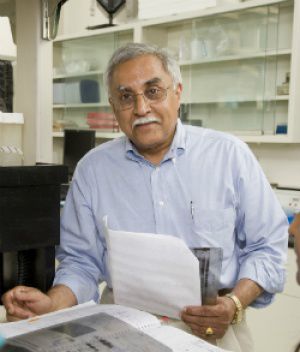Research team of Narayan Avadhani has discovered that targeting cells undergoing metabolic shifts that enable a tumor’s rapid growth — a common practice — may have missed a key pathway that enables the changes in metabolism that benefit tumors.
Additionally, the research, which was published in the journal Oncogene, found that mitochondrial stress can trigger metabolic shifts through a pathway involving p53, a protein largely known to play several roles in cancer.
“In all five cancer cell lines we looked at, we saw that p53 was induced when mitochondrial function was affected,†Avadhani, the Harriet Ellison Woodward professor of biochemistry in Penn’s School of Veterinary Medicine’s Department of Biomedical Sciences, said in a university news release.
“This led to our discovery that it’s possible to promote tumor growth independent of the HIF-1α pathway, which had up to this point been a prime target of therapeutic interventions,†he added.
The discovery potentially unveiled a better understanding of the progression of cancer, with metabolic stress being a biomarker for the disease’s aggressiveness or likelihood to spread.
Previous studies by Avadhani and his colleagues had shown that disrupting mitochondria could lead to tumor growth.
Because p53 is mutated in nearly 50 percent of human cancers, it is widely believed to have a tumor-suppressor function, according to the news release. The researchers decided to take a more detailed look into the connection between mitochondrial stress and p53.
The team experimentally depleted mitochondrial DNA to induce mitochondrial stress in six cell lines, including several cancer cell lines, and found that p53 levels increased in response to the mtDNA depletion in each type of cell. Additionally, they found that p53 inhibited HIF-1α activity.
HIF-1α’s activity was six-times higher in the colon cancer cell line with p53 depleted than in the wild type colon cancer cell line, according to the study.
As a way to ensure that this was not strictly associated with depletion of mitochondrial DNA, the team induced mitochondrial stress using other means and found that all induced p53.
Further investigation revealed that p53 reduced HIF-1α levels in the nucleus and the cytoplasm of cells and that genes responsive to HIF-1α were blunted when mitochondrial DNA was depleted, the university release noted.
Finally, the team demonstrated that, in cells with depleted mtDNA, p53 physically interferes with HIF-1α by preventing it from binding to gene promoters that it would normally and by promoting ubiquitination of HIF-1α, a process that tags the protein for degradation in the cell, the release added.
“We show that mitochondrial stress is a force to be reckoned with,†Avadhani said in the report. “If people are only focused on HIF-1α to prevent a change in metabolism, that might not be enough. Mitochondrial stress can induce all those same changes.â€
In addition to Avadhani, the team was supported by lead author and research associate Anindya Roy Chowdhury, cell biology professor Serge Y. Fuchs, gastroenterology professor Anil Rustgi and doctoral student Apple Long.
The team is working to design therapeutic interventions that target the molecular markers of mitochondrial stress in an attempt to head off the metabolic shift that can help feed solid tumors.

